October 3, 2025 – North America East Coast Lecture Tour (7) Houston
Hello. Today, Sunim’s Dharma Q&A is being held in Houston, the largest city in Texas, USA.
After spending the night in Chicago, Sunim woke up at 4 AM, completed his practice and meditation, and began the day with a live Friday Dharma Q&A broadcast at 5:30 AM local time. Before the broadcast, all luggage was loaded into the car so they could head directly to the airport after the broadcast ended.
With about 3,300 people connected to the live broadcast, Sunim gave his greeting. Since today is Korea’s National Foundation Day (Gaecheonjeol), he spoke about its significance before taking questions.
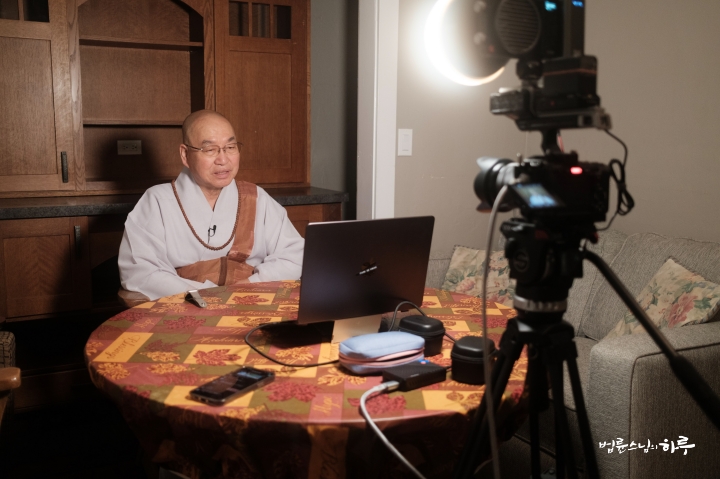
“It seems autumn is deepening. I’m currently in Chicago, in the central United States. The weather here should normally be quite cool, but it’s hot like summer right now. This is probably due to abnormal temperatures.
Today is Gaecheonjeol (National Foundation Day). It’s the day when Hwanung Cheonwang led 3,000 followers to migrate to the Northeast Asian region and first established our nation. In other words, Hwanung Cheonwang, son of Hwanin the Heavenly God, left heaven and descended to this land to establish a nation for the benefit of the people living here. This is expressed as ‘Hongik Ingan’ (broadly benefiting humanity). He established a new nation to broadly benefit humanity. This new nation had the goal of realizing the peace and justice of the heavenly kingdom where Hwanin the Heavenly God resides on this earth as well. This is expressed as ‘Jese Ihwa’ (governing the world with heavenly principles). Because the gates of heaven were first opened this way, we call it ‘Gaecheonjeol’ (Heaven Opening Day).
Hongik Ingan, the First Heart of Our People Who Opened the Gates of Heaven
Gaecheonjeol is not the day when Dangun Wanggeom first established our nation. It refers to when Hwanung Cheonwang first established the Baedal nation, opening Shinshi (Divine City) – this is what we call Gaecheon (opening of heaven). This continued for 1,565 years, and then Dangun, born between the heavenly descendants and the indigenous people living here, finally ascended to the throne. He proclaimed a new nation, which was ‘Joseon.’ While it has been about 4,300 years since Dangun Wanggeom founded Joseon, it has been about 6,000 years since Hwanung Cheonwang first opened the Baedal nation. Since Monk Ilyeon expressed this long history in just a few short sentences in the Samguk Yusa, many people consider it a legend. However, with the recent excavation of the Liaohe civilization, it is increasingly being revealed that this was indeed fact. Thus, Gaecheonjeol is the day our nation’s history began. Since the date when the nation first began is recorded as early October, we currently commemorate October 3rd as Gaecheonjeol.
Despite our people’s long history, unfortunately, in recent times we lost our nation to Japanese imperialism. This led to the March 1st Independence Movement to reclaim our nation. The March 1st Independence Movement aimed not only to reclaim the lost nation but also to build a new nation. Previously, the nation belonged to the king, but now the goal was to create a new nation where the people would be the owners. As a result, when the Provisional Government was established in Shanghai right after the March 1st Movement, it became a movement to establish the Provisional Government of the Republic of Korea, not a restoration movement for the Korean Empire. This can be said to be the root of today’s Republic of Korea. Thus, Gaecheonjeol, March 1st Independence Movement Day, and Liberation Day can be considered the three most important national holidays in the Republic of Korea. Among them, I hope we can all remember today that Gaecheonjeol marks the beginning of the Baedal nation, the first nation established by our people.”
Sunim then had conversations with four people who had submitted questions in advance. Various questions continued for an hour. One person asked for advice on how to let go of the fear of their existence disappearing and the attachment to self felt in the face of death.
I Am Afraid of Death and the Thought That My Existence Will Disappear
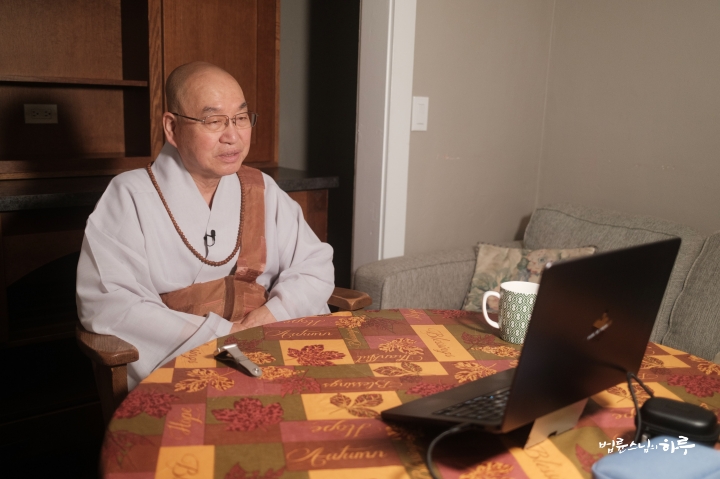
“Looking at how you speak, you seem lively and cheerful, but you have some mental anxiety. Since there’s no other problem and only severe anxiety, if you go to the hospital for an examination and receive a little treatment, you’ll be fine. I don’t think you need to worry too much.”
“Really? I was expecting a philosophical answer about death.”
“Having such thoughts itself is an illness. Thinking ‘What will happen if I die?’ – that itself can be considered an illness. Rabbits don’t live thinking ‘What will happen if I die?’ While religions and philosophies attach profound meaning to this, for a living being to think ‘What will happen if I die?’ is caused by anxiety.
When you think about something in the future like ‘Did I leave the gas on at home? What if there’s a fire?’ the brain creates an illusion as if it’s happening right now. Similarly, if you think a rock might fall from the rooftop and hit you, the brain creates an illusion as if it’s happening now. Then your mind becomes anxious accordingly. You feel anxious and scared when watching horror movies too, right? But when you turn off the power, there’s nothing there. Even though there’s nothing, this happens mentally. When you’re chased by robbers or startled by snakes in dreams and wake up, you might find yourself sweating. This is because your body reacts the same way as if you’re experiencing it directly. Why do you suddenly sweat when you haven’t run, haven’t moved, and were just lying still in bed? Even without applying heat, when the brain creates an illusion, the body responds to it. That’s why your body becomes stiff or sluggish.
If you keep thinking ‘What if this happens in the future?’ or ‘What if I die?’ you’ll become more anxious. When you feel anxious, substances that trigger anxiety are produced more, and conversely, when such substances are produced in large quantities, your psychology becomes anxious again. So first, as emergency treatment, if we supply substances that neutralize this state, you’ll become more stable. Fundamentally, there might be trauma from being startled by something unexpected in childhood. In such cases, if you receive counseling therapy or treat the trauma through meditation, it will improve significantly.
The core issue can be seen as anxiety. If your personality is depressed, it’s very difficult to treat, but since you basically have a lively personality with anxiety, if you go to the hospital for treatment, it will be easily cured. Generally speaking, it’s not at a level requiring hospitalization. However, if you get early diagnosis and quick treatment, you can recover easily. If you leave this alone and try to treat it after it becomes chronic, it becomes very difficult.
There’s also a self-treatment method. Whenever anxious thoughts arise, don’t attach meaning to those thoughts. When thoughts like ‘What if I die?’ arise, don’t think it’s philosophically very meaningful. Don’t think positively like ‘A young person is already having such thoughts.’ Since it’s a kind of pathological thinking, when such thoughts arise, it’s better to shake your head and think of something else. If you think a steel bar might fall on your head, don’t dwell on that thought but immediately think of something else, and the anxiety will disappear. If you can’t do it alone, you need hospital treatment. That’s why I’m telling you to go to the hospital for an examination. If they say you need simple treatment, get the treatment. If they say it’s not serious enough for treatment, whenever such thoughts keep arising, practice breath awareness or think of other things to practice escaping from the anxious state. Then you’ll gradually improve. It may seem like you’re having philosophically important thoughts, but that’s not the case. For a living person to think about death is a symptom of mental illness.”
“Thank you. I understand well. I want to try YouTube broadcasting, but I’m too afraid of how people will see me to attempt it.”
“Just try it.”
“When I broadcast to the public, I naturally have to accept various anonymous reactions. But the moment I see live chat, my heart pounds.”
“That’s exactly anxiety disorder. Get treatment for the anxiety first, then try it. Because you think you must succeed, you can’t attempt it for fear of failure. How can a person succeed right away? It’s normal to fail nine times out of ten attempts. You should think that failure is normal. If you keep success in mind, it’s difficult to attempt. You should think of it as practice. First, get treatment, and second, it would be good to have the perspective of doing it as practice.”
“Thank you. I was initially flustered when you told me to go to the hospital, but I gained courage when you said it’s not a big deal. I’ll study the mind diligently and become a better person.”
“Don’t be too afraid or think it’s difficult to go to the hospital for an examination. Doctors aren’t 100% correct either, but it’s better to get a doctor’s opinion and organize your thoughts. It’s not something that can be solved by someone who doesn’t know just enduring and persevering. Please get a light consultation.”
After finishing the live broadcast, Sunim gave autographed books as gifts to Lim Gwang-seong and Kang Jin-hee, the couple who provided driving and meal preparation during his stay in Chicago, expressing his gratitude. Lee Dong-woo, who lives two hours from Chicago and was in charge of the lecture arrangements, also came to greet Sunim and received an autographed book before expressing his thanks.
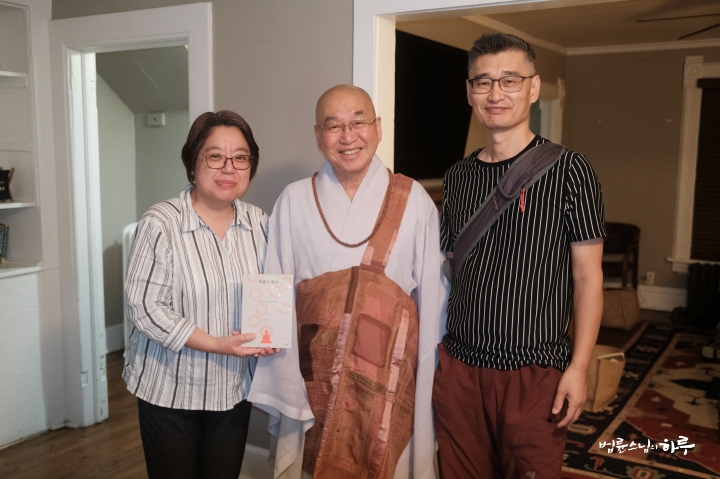
They immediately went to Chicago airport, completed check-in procedures, checked their luggage, and moved to the gate. After arriving at the gate, Sunim had a simple breakfast of bread and beverages while working on manuscript editing. The plane departed Chicago International Airport at 9:10 AM, flew for three hours, and arrived at Houston George Bush International Airport at 12:10 PM.
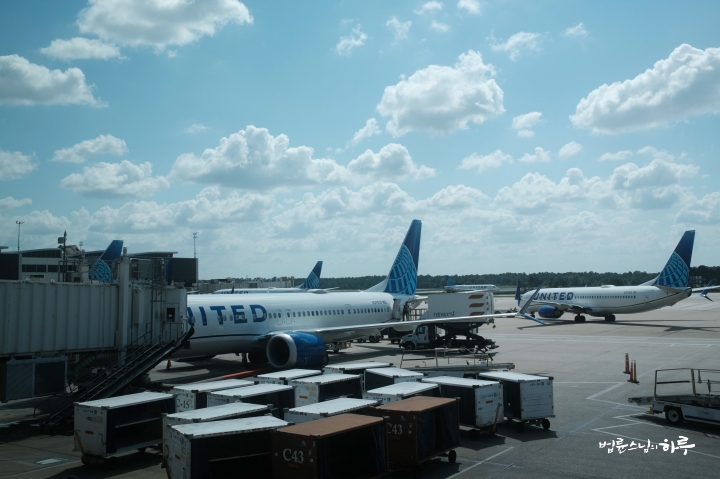
Upon exiting the airport, Park Kyung-won, who was in charge of the Houston lecture, warmly welcomed Sunim. Since this was their first meeting in 8 years since Sunim’s visit to Houston in 2017, they exchanged particularly warm greetings. Koo Bo-kyung also came to meet them, and they took a commemorative photo together before heading to the accommodation.
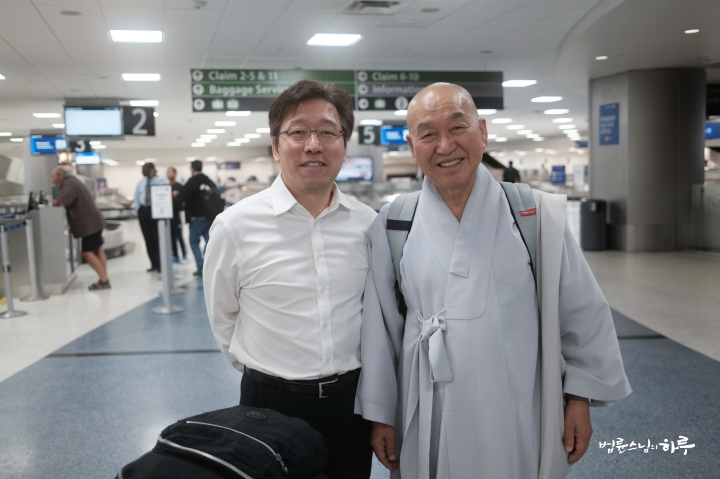
After arriving at the accommodation, they greeted Sunim with three bows for his long-awaited visit to Houston and exchanged updates. They then had lunch with the prepared food. After lunch, Sunim took a brief rest.
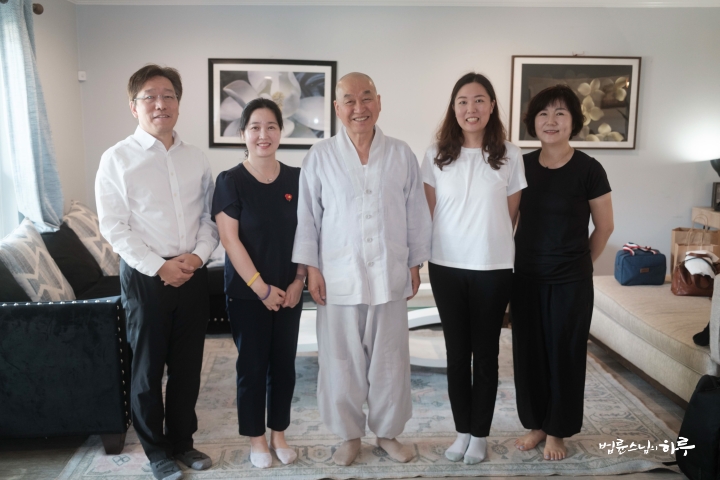
In the afternoon, Kim Jin-wook from Jamaica visited for a brief meeting. After the meeting ended, it was time to start the lecture, so they headed to the lecture venue.
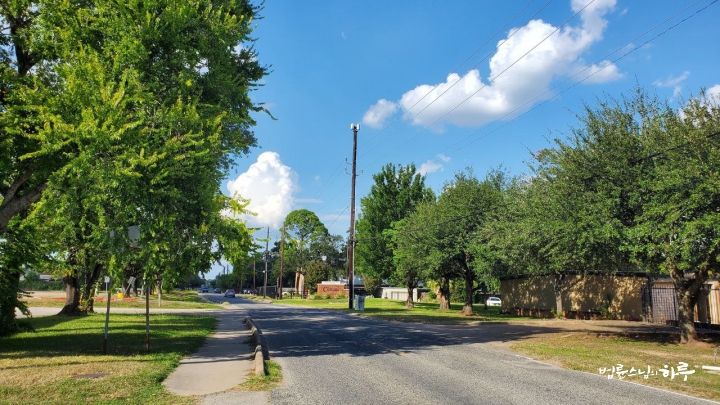
Today’s lecture is being held at the Korean Community Center (KCC) located in the Spring Branch area, the center of the Korean community in Houston. This is a place where Korean community events, cultural programs, language classes, volunteer activities, seminars, and gatherings are actively held, and today Venerable Pomnyun Sunim’s Dharma Q&A is being held here.
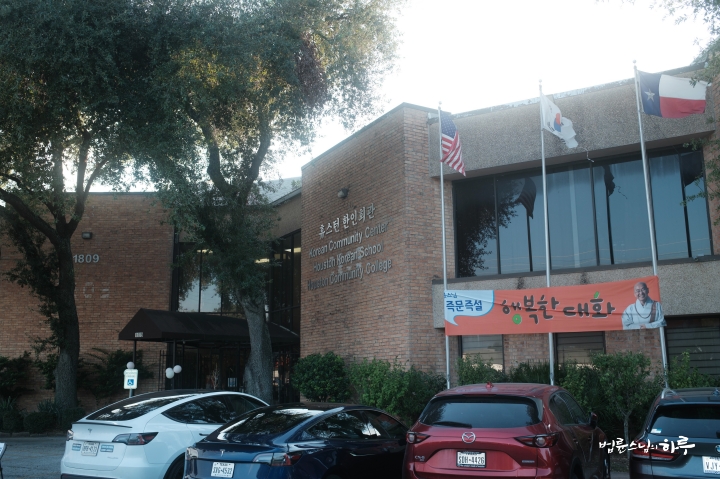
The accommodation and lecture venue were only 10 minutes apart, and many Korean signs were visible along the way. This area is now becoming a Korean district, with many Korean-owned stores and three Korean markets, they said. The atmosphere of change was strongly felt.
Upon arriving at the lecture venue, volunteers warmly greeted Sunim. After exchanging greetings with the volunteers guiding at the entrance, Sunim rested in the waiting room before entering the lecture hall at the scheduled time.
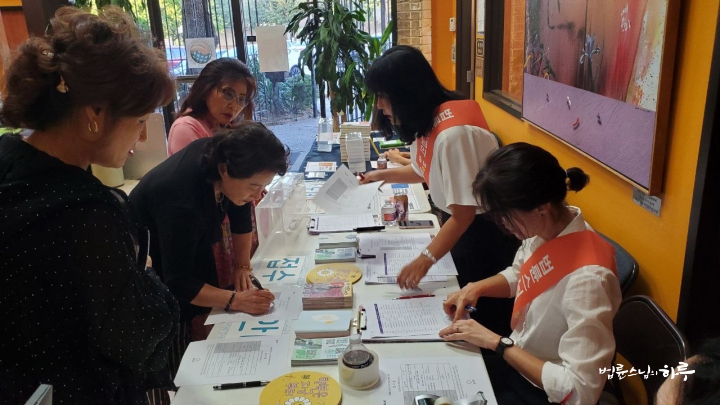
With about 130 people seated, at 7 PM, a video introducing Sunim was shown. When the video ended and Sunim went up on stage, many in the audience welcomed Sunim with loud applause for his long-awaited visit to Houston.
First, Sunim gave his greeting. He began the conversation by recalling his memories of visiting Houston a few years ago.
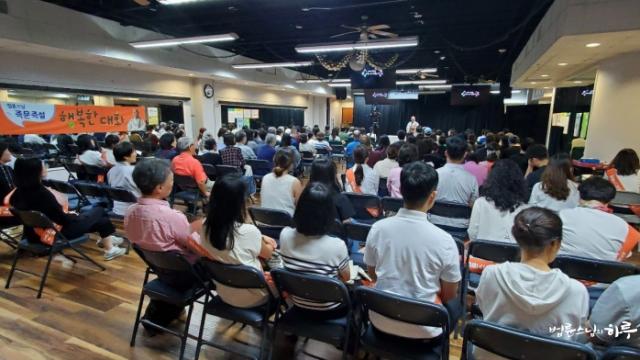
“I remember coming to give a lecture when Houston suffered major damage from flooding a few years ago. We collected and delivered donations at that time. I heard that after that, there was damage from a cold wave as well. These days, many unexpected things seem to be happening due to climate change. I heard that Houston being submerged in flood water was the first time in history. After that, in this hot region, the temperature dropped to minus 10 degrees Celsius, causing pipes to burst everywhere and creating chaos.
Dharma Q&A is not where a speaker lectures on a special topic, but where you select the topics. Any topic is fine. Dharma Q&A is a place for dialogue based on your interests. Now, let’s begin our conversation.”
Following this, anyone could raise their hand and ask Sunim questions. One person from San Antonio said they had traveled 5 hours to ask a question. During the two hours, nine people were able to have conversations with Sunim. One of them asked about ways to help their children in their mid-20s who still depend on their parents to stand on their own.
Children in Their Mid-20s Still Depend on Their Parents
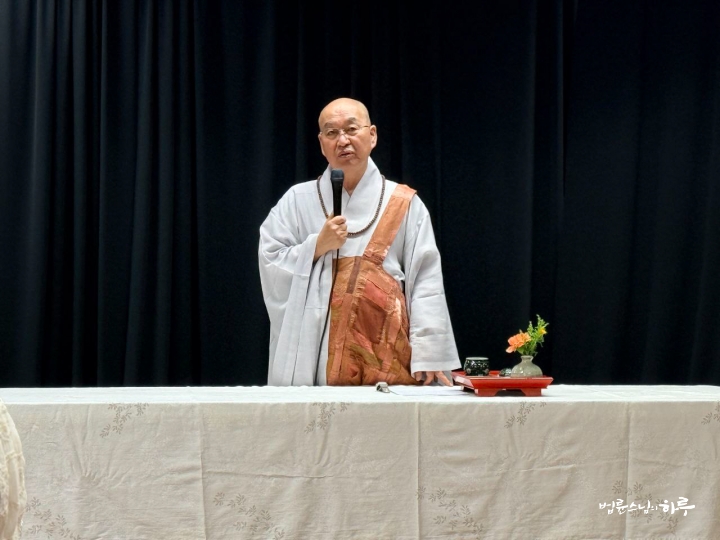
“First, it’s true that not being able to care for your children attentively until they were three years old has psychological effects on them. However, while this greatly influences conditions like depression and anxiety, it has little to do with independence. For human happiness, warm care until age three is important for psychological stability, but to instill independence so children can live their own lives, it’s important not to interfere too much during adolescence and to watch over them as they go through trial and error.
The problem you’re concerned about isn’t so much from not caring for them well when they were young, but rather from interfering too much during their adolescence with ‘You shouldn’t do this, you shouldn’t do that,’ which deprived them of opportunities to make their own decisions. That’s why I say you should be happy when children don’t listen during adolescence. You should be glad, thinking ‘They’re trying to become adults’ or ‘My child has their own thoughts,’ not scold them saying ‘How dare you not listen to your parents!’ Your diagnosis is wrong. What you’re problematizing is an issue that arose during their adolescence, not from their childhood. If a child has depression, won’t come out of their room, has emotional wounds, is anxious, or constantly worries, that’s from not providing proper psychological stability when they were young. If both issues overlap, then both were lacking.
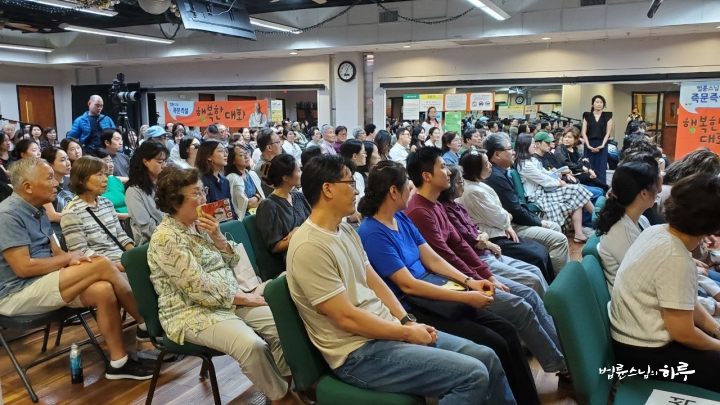
What you can do now is, first, not to have high expectations. It doesn’t help to say things like ‘Why do you keep making that an issue? It’s no big deal’ when you couldn’t even care for them warmly when they were young. What can they do when they’re psychologically anxious? It also doesn’t work to say ‘You can’t even do that?’ What can they do when they’ve never tried? Starting today, have them at least set spoons on the table at mealtime, or bring a mop when cleaning. Say things like ‘Mom’s tired. Could you bring me the mop?’ and do housework together so they learn how to sweep and mop rooms. Don’t just order them around. If mom doesn’t do it herself but says ‘You should do it,’ the children will resist. Conversely, if you leave them alone, they won’t learn. You need to ask for help, like ‘Oh, my back hurts. Could you finish mopping this room?’ so they can try once, twice, three times and learn through doing.
Just because I said people should be independent after twenty doesn’t mean you should suddenly tell young adults who don’t know how to do anything, ‘Get out of the house. I heard from Sunim that we should make you independent.’ That’s why children complain to me. It’s like raising them as puppies and then suddenly abandoning them in the forest telling them to become wild animals. From now on, you need to stop interfering. When your child asks something, don’t dismiss them with ‘Figure it out yourself.’ Give some advice while saying things like ‘Is that what you think? Mom doesn’t know much about that issue. I’m from an older generation.’ If you reject them first when they ask, the child gets hurt. They may be grown in age and size, but they’re still children inside. You need to have conversations with some acceptance, saying things like ‘Is that what you think? Mom hadn’t thought of it that way,’ rather than opposing them from the start. Help them find their own methods by saying ‘Mom doesn’t know either, so let’s research it together.’
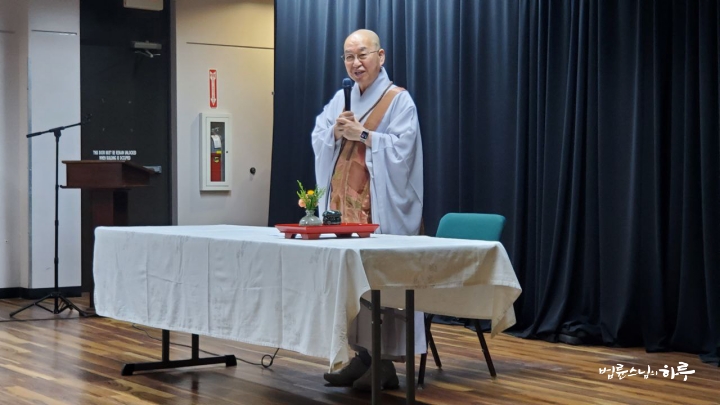
You shouldn’t think you need to train your child to make them creative. Creativity doesn’t come from training. When someone trains them in a rigid way, they become dependent on that system.
Your question about what role you should play for your children is the same. You’re trying to make the same mistake again. Now you shouldn’t neglect them, but you also shouldn’t interfere. You should watch over them and help when they ask for help, not constantly think about what role you should play. When your child asks for help, help them. If you can’t help, apologize. If they complain, say ‘I’m sorry dad couldn’t do better for you.’ But don’t speak as if you’ve committed a crime – that’s even worse for the children. Now you need to treat your children as adults. Only when parents treat their children as adults at home will they play adult roles outside. It’s not right to treat them like children when they come home. If you treat them with the mindset that they’re now adults, they can gradually recover.”
“Thank you.”
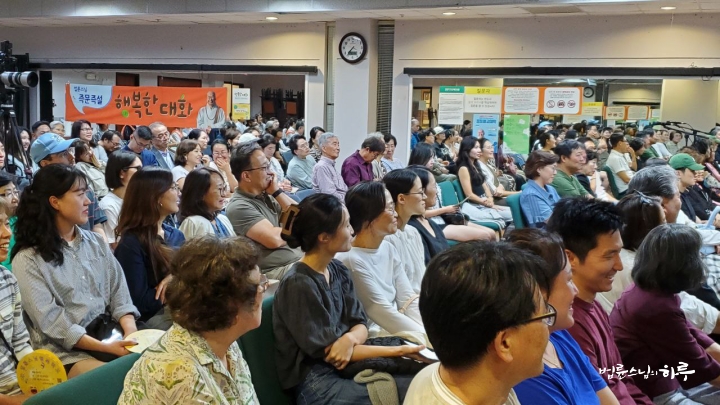
Questions continued one after another.
• When I work lightly, things go well, but when I work hard, things don’t go well. Why is that?
• While raising children, I keep comparing them to other people’s children and end up in conflict with my wife. How can I maintain my center?
• What can overseas Koreans contribute to peace and unification on the Korean Peninsula?
• I’m holding my father’s memorial service in the US. Can I tell my son I’m passing it on to him, or
shouldn’t I even mention it?
• Is humanity currently following a path of coincidence or inevitability?
• My child seems unable to determine their own path. What should parents do to help their child live well as a member of society?
• I’m a housewife with many tasks and a very busy schedule. When it gets too hard, what should I let go of first?
• My child, who just started working, commutes from home. Should I charge them for living expenses?
• I’m writing about the connection between Buddhist scriptures and nursing. Should I write based on Buddhist scriptures, or should I write in a more public-friendly way?
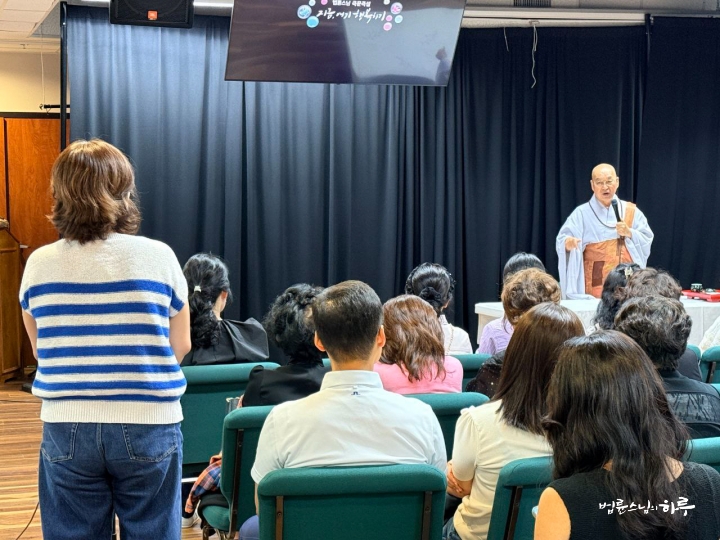 As the conversation continued, it was time to conclude. Although there were more people who wanted to ask questions, the lecture ended as the scheduled time arrived.
As the conversation continued, it was time to conclude. Although there were more people who wanted to ask questions, the lecture ended as the scheduled time arrived.
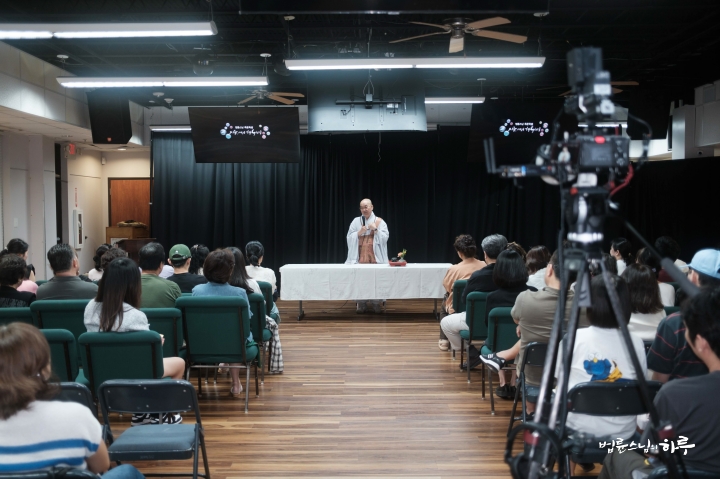
A book signing session followed. Many people were disappointed they couldn’t purchase books as the prepared copies ran out. Most people expressed their gratitude to Sunim when receiving their signatures.
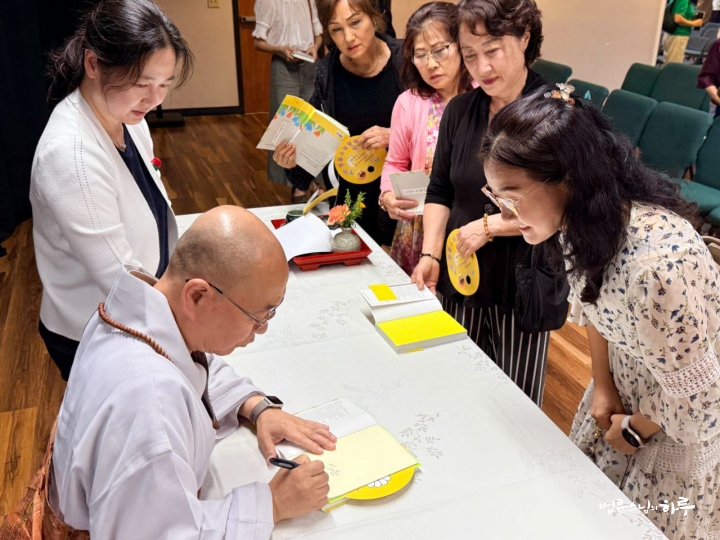
After all the audience members left the venue, Sunim took a commemorative photo with the volunteers who prepared the lecture.
“Houston, Let’s go”
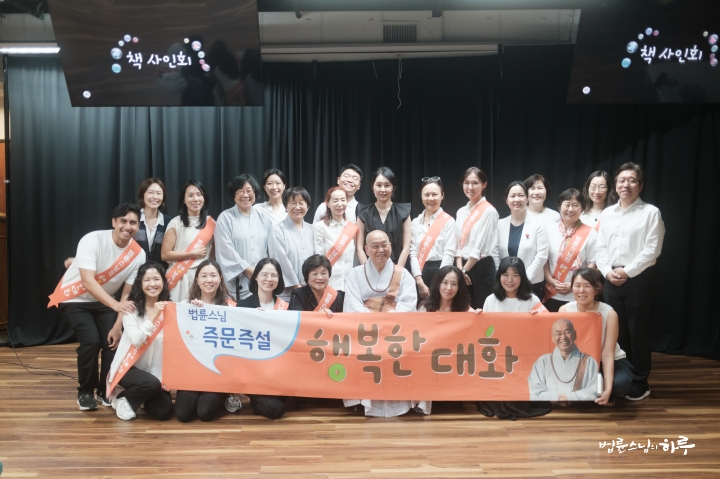
Sunim also presented signed books to Park Kyung-won, who was in charge of overall coordination, and Yang Hae-mi, who served as deputy coordinator, and took commemorative photos with them.
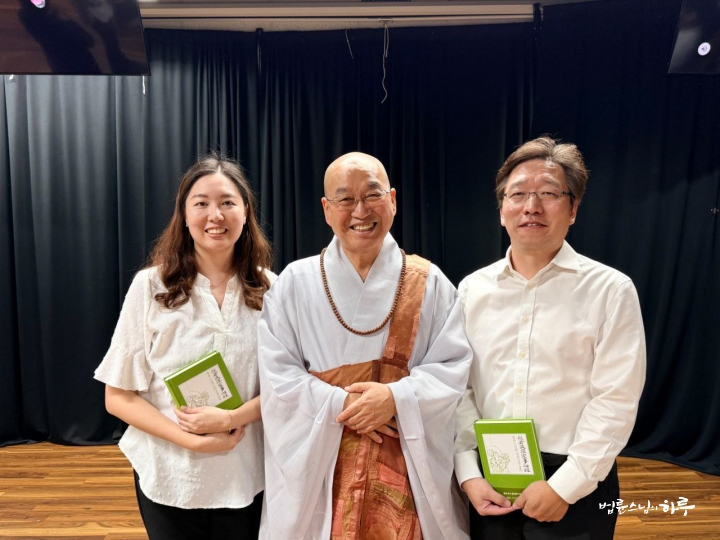
The volunteers had a mindful sharing session with Dharma Teacher Myodeok and Dharma Teacher Beophae. First, Park Kyung-won, who coordinated the lecture, shared her thoughts.
“It was a truly happy feeling I haven’t experienced in a long time. I could feel the same emotion today that I felt 15 years ago when we finished the Austin and Houston lectures with Sunim. Thank you for making this lecture possible in Houston.”
Many others also shared how their lives became happier after watching Dharma Q&A on YouTube, and how wonderful it was to experience it in person. Thanks to about 20 volunteers, including those who traveled 3 hours from Austin, those from LA, and those who had previously attended lectures in Chicago, the event was successfully completed.
Sunim arrived at the accommodation, had dinner with porridge, discussed tomorrow’s schedule, and concluded the day’s activities.
Tomorrow, he will travel to Atlanta, the largest city in the southeastern United States, to continue with the final lecture of this North American East Coast tour.





